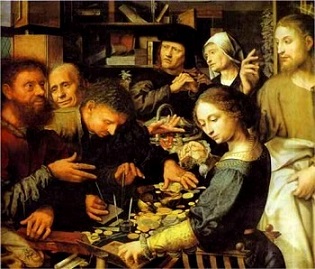 Outward appearances can sure be deceiving sometimes. Things are not always what they appear to be on the outside, especially when it comes to people. That is why we really have to work hard at not judging people by their outward appearance. The first reading for mass today says that, “There was no other child of Israel more handsome than Saul; he stood head and shoulders above the people.” It sounds like he had everyone charmed, maybe even God. Why else would God choose the most handsome man in the land, to govern His people?
Outward appearances can sure be deceiving sometimes. Things are not always what they appear to be on the outside, especially when it comes to people. That is why we really have to work hard at not judging people by their outward appearance. The first reading for mass today says that, “There was no other child of Israel more handsome than Saul; he stood head and shoulders above the people.” It sounds like he had everyone charmed, maybe even God. Why else would God choose the most handsome man in the land, to govern His people?
If you know very much about Saul though, you know what kind of person he turned out to be. Saul was hand picked by God to lead His people in today’s reading, so he must have seen a lot of good traits in him. But, if we read a few more chapters into the book of Samuel, we will find out that God withdrew his anointing of Saul because he disobeyed the specific instructions that God had given him to follow, and did whatever he and his men felt like doing instead.
Saul fell from grace rather quickly, and that is when God changed his mind and withdrew Saul’s blessing and chose David to become king, instead. But, there are a few lessons in all of this for us as well. First of all, just because we are in a state of grace in God’s eyes right now, does not mean we will remain so. Many people in the bible who were very close to God, or Jesus, fell from a state of grace and even jeopardized their own salvation, because of their sinful tendencies. Satan snares people over little things that we aren’t paying close enough attention to. The second thing to notice is that God did not necessarily know what Saul would do in the future. Saul had free will and God respects our freedom to make our own choices in life. Everything isn’t cut in stone, or predetermined by God. We still determine our own destiny, by the choices we freely make.
When Jesus walked by Saint Matthew, who was a tax collector called Levi at the time, and said, “Follow me” Matthew did. No questions asked. He got up, left his job and followed him. It was the best decision of his life! Jesus evidently saw something in Levi that no one else did – the potential to be his apostle, but also the potential to become a saint. He had what it took, to serve Jesus and his new church that was just beginning to be formed. And, through his written words, Saint Matthew has served every Christian that has ever lived, or will ever live until the end of time. What he originally appeared to be on the surface of things was deceiving.
Jesus ate a meal with many tax collectors and “sinners” and was criticized for it by the Pharisees. They asked his disciples why he was eating with sinners? Jesus responded, “Those who are well do not need a physician, but the sick do. I did not come to call the righteous but sinners.”
Actually Jesus didn’t call the most righteous or holiest people to be his disciples either. Sometimes when people come to understand the error of their ways, when they do discover the truth, their love for the Lord is even deeper than those who have lived a righteous life all along. That was the case with Mary Magdalene, Zaccaeus and Levi the tax collector too.
Jesus understood people, and understood love better than any of us ever will. But, we should still try to learn from him. Instead of finding fault with our family members, or other people in the community who seem to be such obvious sinners, maybe we should try to spend time with them instead. Acceptance, inclusiveness and love are what changes people, into better human beings. Not our judgements about them, or even our clear cut sense of what is right and what is wrong. Sin has to be set aside sometimes, in order to see the person. The greater the sin, the more patience, compassion and respect we should show them.
That’s enough to think about for the rest of the day. Who do we view to be the worst sinners in our lives? Maybe we should work a little harder toward changing our attitudes about them.
